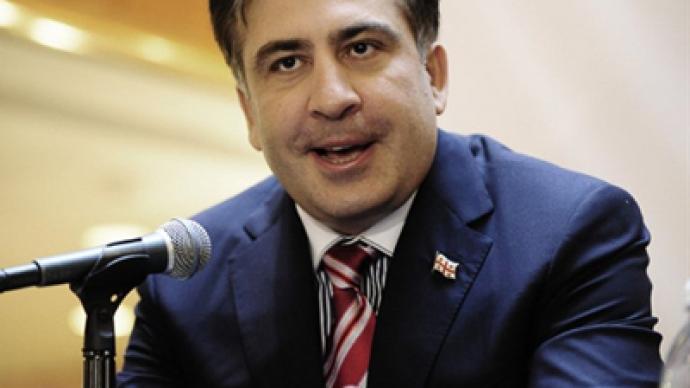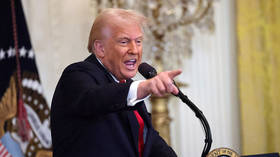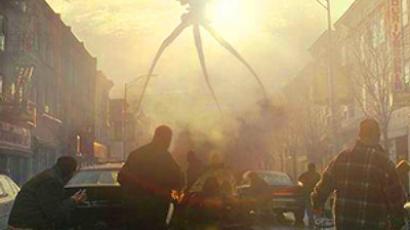Saakashvili talks tough as Georgian opposition promises change

Georgian President Mikhail Saakashvili continues to attract scrutiny from Russians and Georgians alike with his militarization projects that are creating tension at home and abroad.
At the top of the Georgian leader’s wish-list are anti-air and anti-tank weapons, as he says his country already has enough “small arms.”"We don't really need small arms, we have plenty of them and actually there are many alternative sources to shop for them," Saakashvili told The Cable, a US-based political journal. "What Georgia really needs is something that it cannot get from anywhere else and that's anti-air and anti-tank [weapons] and that's completely obvious … that's where the next stage of the cooperation should be."Meanwhile, Georgia continues to cozy up to NATO, and has over 1,000 troops deployed in Afghanistan. During his trip to Washington, Saakashvili met with General David Petraeus, the commander of US and NATO forces in Afghanistan.Last week, President of NATO Parliamentary Assembly Karl A. Lamers praised Georgia's moves on the path of integration into the North Atlantic Alliance. Tbilisi reported that Lamers "on behalf of the NATO Parliamentary Assembly expressed his support for the territorial integrity and sovereignty of Georgia and praised as positive the steps that Georgia has taken towards integration into NATO."Georgian opposition speaks outAs Tbilisi continues to suffer political and economic benefits due to its fallout with Moscow, the Georgian opposition is promising to step into the vacuum.Levan Gachechiladze, the head of the opposition Georgian Party, is ratcheting up the pressure on Saakashvili, is pledging to increase pensions and start paying unemployment benefits by sharply scaling back the defense budget."The incumbent authorities are spending enormous sums from the budget on militarization and reinforcing the police,” Gachechiladze said this week in the town of Kharagauli. “We will certainly come to power and then act solely in the interests of the people and Georgia.”He added that if the Georgian Party comes to power, it is will be interested in normalizing relations with Russia.Meanwhile, Georgian Labor Party leader Shalva Natelashvili has accused some US congressmen of sponsoring Saakashvili."The people of Georgia and the United States must know that US congressmen support the dictator Saakashvili," he told a Monday press briefing. Natelashvili, who was in the United States last week, labeled the Saakashvili government a “terrorist regime.”"If this support to the Saakashvili terrorist regime does not stop, our party will do everything necessary to inform US voters whose friends in Georgia their congressmen are," he said.Clearly, it's not just Moscow that has reservations about the Georgian leader.The Labor Party leader organized a protest in front of the White House last week. Several dozen Georgian citizens, demanding that Washington cut off all formal ties with Saakashvili and his government, participated in the protest.Remembering August 2008Ever since Georgia launched a massive artillery attack in August 2008 on the South Ossetian capital, Tskhinvali, which culminated in a five-day conflict between Russian and Georgian troops, Moscow has been watching Saakashvili with a wary eye.And with good cause, it seems. After all, 71 Russian peacekeepers were killed and 340 wounded in the crack-of-dawn surprise attack on Tskhinvali. And with the Georgian leader now priming foreign governments for weapons and membership in NATO, this is a history lesson that Russia – and the West – should not forget. Saakashvili practically acquired sainthood during those five days of war, largely because media reports of the war were so skewered in Tbilisi’s favor. In fact, some in the West still believe, despite all the evidence to the contrary, that Russia was responsible for starting the conflict. Shortly after a ceasefire was announced by Moscow and Tbilisi, a group of journalists paid a visit to the battlefield firsthand and spoke to eyewitnesses.“Over the past couple of weeks, a spate of reports has appeared in the American and British media, questioning many assumptions about that war, chief among them that Russia was the guilty party,” reporter Mary Dejevsky wrote in The Independent.Together with fellow journalists from the BBC and The New York Times, Dejevsky traveled to South Ossetia in an effort to “establish the facts.”“Not the ‘facts’ as told by the super-slick Georgian PR machine at the time,” Dejevsky explained, but rather “the facts as experienced on the ground by those who were there: civilians, the local military commander, and the small number of unarmed monitors stationed in the region by the Organization for Security and Cooperation in Europe.”The conclusion, for those who had forgotten or never knew: “Georgia launched an indiscriminate military assault.” The European Union also made a similar conclusion following its own lengthy investigation."There is the question of whether the use of force by Georgia in South Ossetia was justifiable under international law,” the EU report stated. “It was not."Understandably, with such a government south of the border, Moscow is concerned about Georgia’s ongoing militarization. Now, it is Saakashvili who is calling for Russia to “compromise,” even saying that Georgia will work to keep Russia locked out of the World Trade Organization (WTO), of which Tbilisi is a member."It's up to the Russians to show that they can go to flexible and compromise solutions," Saakashvili said. "Russians have said we can get [WTO membership] without Georgia…But Georgia is not going to compromise our principles." An increasing number of people both in Russia and in the Georgian opposition are wondering exactly what those “principles” are. Robert Bridge, RT















